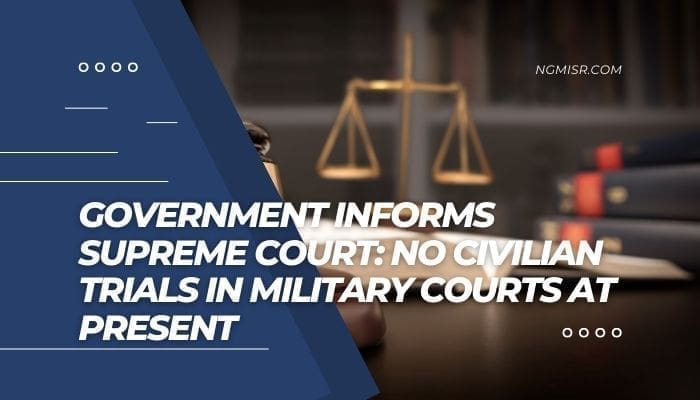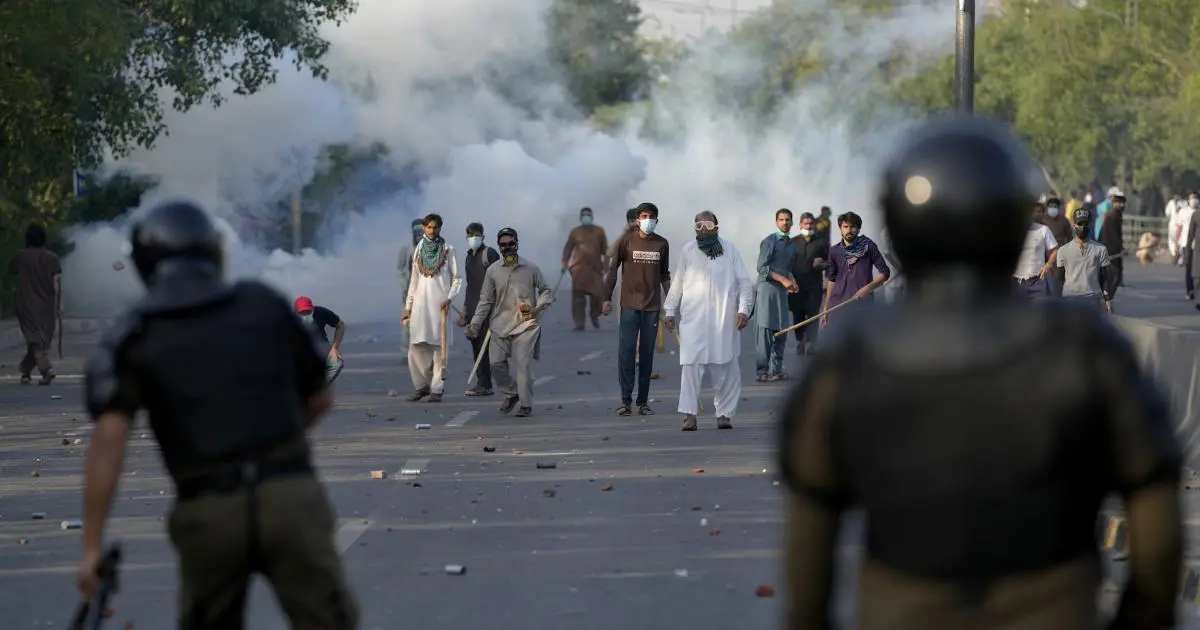Tuesday, during the fourth hearing of a set of petitions challenging the prosecution of civilian protestors in military courts, the government stated that military tribunals are not currently conducting trials.

During the previous day’s hearing, Chief Justice Umar Ata Bandial asked Attorney General for Pakistan (AGP) Mansoor Usman Awan to guarantee that no such trials would occur while the case was being heard.
The AGP stated that there were no ongoing civilian proceedings.
Later in the evening, however, Major General Ahmed Sharif Chaudhry, director general of Inter-Services Public Relations (ISPR), stated that proceedings against the 102 civilians delivered over for trial had already begun.
The petitions challenging the government’s decision to try civilians in military tribunals are being heard by a six-member bench led by Justice Bandial and including Justice Ijaz ul-Ahsan, Justice Muneeb Akhtar, Justice Yahya Afridi, Justice Ayesha Malik, and Justice Mazahir Ali Naqvi.

The government announced that those responsible for the violence that erupted on May 9 and resulted in the destruction of numerous government buildings and army installations would be tried under army laws.
Former prime minister Imran Khan, former chief justice Jawwad S. Khawaja, legal expert Aitzaz Ahsan, and five members of civil society, including Piler Executive Director Karamat Ali, filed separate petitions urging the supreme court to declare military tribunals unconstitutional.
During the previous hearings, Khawaja Ahmed Hussain, representing Khawaja, Latif Khosa, representing petitioner Aitzaz Ahsan, and Faisal Siddiqui and Salman Akram Raja, representing civil society, presented their arguments.
Subsequently, Khan’s attorney took the podium and highlighted the AGP’s and Chaudhry’s contradictory statements.
Referring to Chaudhry’s press conference on Monday, the attorney noted that 102 individuals’ trials were mentioned. He highlighted the contradictory statements made by the AGP and the ISPR chief.
The AGP responded by reiterating his previous statement, stating, “I stand by my statement even today.” Moreover, he indicated that the representatives of the Ministry of Defense, who were present in court, could provide a more comprehensive explanation of the situation.

Justice Ayesha stated, “We are currently examining existing judicial precedents,” indicating that the court was actively evaluating pertinent legal precedents.
In addition, Justice Bandial expressed confidence in the AGP’s declaration and shifted the court’s attention to the ongoing proceedings.
Khan’s attorney, Uzair Bhandari, argued during the hearing that a constitutional amendment was required for the approval of civilian trials in military tribunals by the legislature. He cited the 21st Amendment, which established that a constitutional amendment was required for the trial of civilians.
Justice Ayesha questioned whether a civilian trial could be held in military tribunals for internal matters, to which Justice Afridi replied that the 21st Amendment addressed such defense-related issues.
Justice Afridi remarked that the ISPR press conference from the previous day had shed light on the situation.
Justice Ahsan stated that the court could not disregard the precedent of civilians being tried in military tribunals, recognizing that each case presented its own unique circumstances and reasons.

Bhandari argued that any trial of a civilian by the military should require a constitutional amendment.
However, Justice Akhtar stated that a military trial could be held in times of emergency or conflict, emphasizing that civilian trials in military courts could not be held if fundamental rights were not suspended.
The attorney representing the PTI’s leader responded that the 21st Amendment stipulated that military trials could only occur during times of conflict.
Bhandari emphasized the evolution of the Constitution, laws, and fundamental rights, citing Article 10-A (right to a fair trial) and the significance of Article 175(3) regarding the separation of the judiciary and the executive. Although these articles were distinct, he argued that they were interconnected.
Bhandari argued that the trial must be presided over by a judge appointed pursuant to Article 175.3. He was concerned about the negative perception and unease the military prosecution of civilians was causing in the country.
He further questioned the application of the Official Secrets Act, stating that if the military was involved in a variety of fields, including athletics, would the Army Act apply?
The CJP emphasized the importance of sustaining high morale within the army and the potential repercussions on national security if this were not the case.

